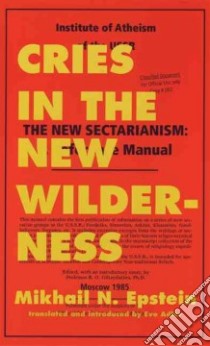Cries in the New Wilderness - 9780967967554
Un libro in lingua di Epshtein Mikhail N. edito da Paul Dry Books Inc, 2002
- € 14.30
- Il prezzo è variabile in funzione del cambio della valuta d’origine
Inside the disintegrating Soviet Union, Raisa Omarovna Gibaydulina, a professor of scientific atheism at the Moscow Institute of Atheism, compiles a selection of excerpts from the articles, sermons, manifestos, and other writings by members of banned religious sects. Copies of this classified reference manual, The New Sectarianism, are smuggled to the West, where intellectuals attempt to assess the late-Soviet spiritual movements. A record of Gibaydulina's own spiritual quest is preserved in the notes and letters she writes during the post-Soviet years before her death in April 1997.
Such is the form of Mikhail Epstein's Cries in the New Wilderness, a work of extraordinary artistic and philosophical imagination, begun in Moscow in the mid-1980s and now available for the first time in English translation in an expanded version. Drawing on his own participation in Moscow's intellectual associations and in expeditions to study popular religious beliefs in southern Russia and Ukraine, Epstein recreates the spiritual experience of a whole Russian generation. His is not a documentary book, however, but a "comedy of ideas," in which he constructs from the voices he hears in the culture around him the religious and philosophical worldviews of Foodniks and Domesticans, Arkists and Bloodbrothers, Atheans and Good-believers, Steppies and Pushkinians.
Cries in the New Wilderness is filled with the voices of these sects, from the mystical Thingwrights and the absurdist Folls to the messianic Khazarists and the doomsday Steppies. As a counterpoint to this medley of comic, grotesque, poetic, banal, poignant, and harrowing voices is the voice of the commentator, Professor Gibaydulina, who struggles to maintain the purity and objectivity of her scientific atheism in the face of an amazing variety of religious experiences. Epstein's depiction of the inner drama of Gibaydulina's response to the crumbling of the Soviet Union and her quest for a new, creative atheism adds a tragic note to his polyphonic work.
An award-winning essayist and critic, Mikhail Epstein has been compared to Jorge Luis Borges for his literary inventiveness and to Walter Benjamin for his acute observation of cultural phenomena. Transcending genres and disciplines, Cries in the New Wilderness is a brilliantly original work, a "virtual document" that illuminates the spiritual condition of the Soviet Union as it reveals unsuspected affinities between Russian and American culture. In the mirror of Soviet society, we recognize our own enthusiasm for alternative spiritual experiences, our worship of technology, our doomsday cults. We may also recognize that we ourselves are participants in many of the sects Mikhail Epstein describes, sects that seem at first fantastic and outlandish, but prove to be the religious basis of our own lives.
"Cries in the New Wilderness presents a completely new view of the spiritual life of Russian society. . . The book is full of tragicomic tension and brings to mind the multivoiced novels of Dostoevsky." —Ilya Kabakov
Mikhail Epstein was born in Moscow in 1950 and graduated from Moscow State University summa cum laude in philology in 1972. He was the founder and director of the Laboratory of Contemporary Culture in Moscow. In 1990 Epstein moved to the United States, where he spent a year in Washington, DC, as a fellow at the Woodrow Wilson International Center. He is now Samuel Candler Dobbs Professor of Cultural Theory and Russian Literature at Emory University.
Epstein's recent books in English include After the Future: Paradoxes of Postmodernism and Contemporary Russian Culture; Russian Postmodernism: New Perspectives on Post-Soviet Culture (with two coauthors); and Transcultural Experiments: Russian and American Models of Creative Communication (with Ellen Berry). He is the author of 15 books and approximately 400 essays an
Informazioni bibliografiche
- Titolo del Libro in lingua: Cries in the New Wilderness
- Sottotitolo: From the Files of the Moscow Institute of Atheism
- Lingua: English
- Autore: Epshtein Mikhail N.
- Editore: Paul Dry Books Inc
- Collana: Paul Dry Books Inc (Paperback)
- Data di Pubblicazione: 01 Agosto '02
- Genere: RELIGION
- Argomenti : Religion and culture Russia (Federation) Fiction Sects Russia (Federation) Fiction
- Pagine: 236
- Dimensioni mm: 228 x 152 x 19
- ISBN-10: 0967967554
- EAN-13: 9780967967554


